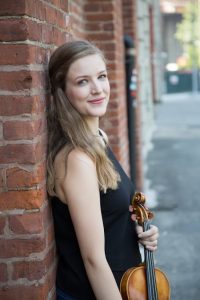Q&A with Haley Gillia, violin
 This past summer the Bowdoin International Music Festival welcomed 255 student participants from 27 countries and 30 states, including 17 remarkable Festival Fellows. Sixty-five percent of these participants received scholarship funds from the Festival. In celebration of an incredible 2016 season and in anticipation of an even better 2017 season, we’ve reached out to last year’s participants to reflect on their experience at the Festival and their lives as musicians.
This past summer the Bowdoin International Music Festival welcomed 255 student participants from 27 countries and 30 states, including 17 remarkable Festival Fellows. Sixty-five percent of these participants received scholarship funds from the Festival. In celebration of an incredible 2016 season and in anticipation of an even better 2017 season, we’ve reached out to last year’s participants to reflect on their experience at the Festival and their lives as musicians.
BIMF: What are some of your earliest musical memories?
Haley: I remember learning “Hot Cross Buns” and thinking it was the hardest piece and that I would never be able to learn it. My first performance is still vivid in my memory – it was in Kindergarten during a school assembly, and I remember my friends hugging me at the end when I went over to sit with them. My dad used to take me to see the New York Philharmonic when I was really young, and the adults around us were always skeptical when they saw me – at first – but they relaxed when they saw I was well behaved and focused on the music, although sometimes I would crawl into my dad’s lap.
BIMF: At what age did you start playing your instrument?
Haley: Three years old.
BIMF: Does the instrument you play on have a story?
Haley: I play on a violin made in 2006 by the Knoxville Tennessee maker Kelvin Scott. I had been trying violins in New York and wasn’t finding one that I loved until I contacted Kelvin Scott. The violin was previously owned by a graduate student at Northwestern University.
BIMF: What is the longest you’ve ever spent preparing a piece of music?
Haley: My undergrad audition concerto, Prokofiev Concerto No.2. I spent about six months working on it and then the audition process added another few months. The more you play a piece the more you realize there’s never a point where the work is done.
BIMF: If you could play with any musician who would it be and why?
Haley: Janine Jansen. I love her sound and her musicality.
BIMF: How do you make a well-known piece of music your own?
Haley: Making a piece your own is what student musicians spend so much time discovering. It’s a balance between learning from your mentors, your peers, and yourself. I think it’s a never-ending process of discovering what you want to say with the music and how to achieve that.
BIMF: How would you explain your passion for chamber music to a non-musician?
Haley: I love chamber music because it’s so human in scale. Every instrumental voice is absolutely essential, and so is every human voice in the group. Rehearsals include lots of brainstorming, discussing opposing views, matching intonation, experimenting with different ideas or strokes, learning to breathe together, etc. Uncovering the musical potential in every passage is only possible when the group dynamic is just right. Finding ways to work with and discuss how to improve something with different musicians is such an important skill.
BIMF: What was one highlight of the 2016 Festival for you?
Haley: Performing Shostakovich String Quartet No. 3. I was playing with three great friends I had made at the Festival, and we all worked so hard to pull it together and had so much fun while doing it. We had each voiced our opinions during the rehearsal process. Sometimes our views were opposing, and those different points of view always seemed to lead us to a greater end result. We also owe a huge debt to our coach, Mikhail Kopelman, who taught us so much – about playing the piece, chamber music, and his amazing life in music. I trusted my fellow players and felt safe on stage. It was exhilarating.
BIMF: What’s next for you after the Festival?
Haley: My goal is to play music for the rest of my life, whatever that may look like. I plan to make chamber music a huge part of my life.
BIMF: What advice would you offer to an aspiring musician?
Haley: I have learned that 1) it’s extremely important to focus on your own musical journey. Everyone is on their own path and has their own voice. 2) Be kind! This can take you a long way. Besides, what’s the point of playing music if you’re not letting it bring you joy and satisfaction and letting that translate into your interactions with your fellow musicians and your everyday life? The world needs more love. 3) Be on time for rehearsals, lessons, and performances. That really means be early and ready to go!
